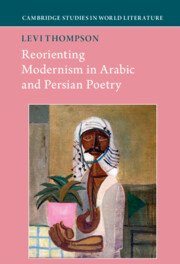Book contents
- Reorienting Modernism in Arabic and Persian Poetry
- Cambridge Studies in World Literature
- Reorienting Modernism in Arabic and Persian Poetry
- Copyright page
- Contents
- Acknowledgments
- Note on Transliteration
- Introduction
- Part I Crafting a Modernist Geography across Arabic and Persian Poetry
- Part II Imagining New Worlds
- Chapter 3 Aḥmad Shāmlū’s Manifesto and Proto-Third World Literature
- Chapter 4 Badr Shākir al-Sayyāb between Communism and World Literature
- Part III Aftermath
- Notes
- Bibliography
- Index
Chapter 3 - Aḥmad Shāmlū’s Manifesto and Proto-Third World Literature
from Part II - Imagining New Worlds
Published online by Cambridge University Press: 24 November 2022
- Reorienting Modernism in Arabic and Persian Poetry
- Cambridge Studies in World Literature
- Reorienting Modernism in Arabic and Persian Poetry
- Copyright page
- Contents
- Acknowledgments
- Note on Transliteration
- Introduction
- Part I Crafting a Modernist Geography across Arabic and Persian Poetry
- Part II Imagining New Worlds
- Chapter 3 Aḥmad Shāmlū’s Manifesto and Proto-Third World Literature
- Chapter 4 Badr Shākir al-Sayyāb between Communism and World Literature
- Part III Aftermath
- Notes
- Bibliography
- Index
Summary
Chapter 3 focuses on the poetry of the Iranian Aḥmad Shāmlū and his pioneering imagination of what would eventually come to be called the Third World in his second collection of poetry, The Manifesto, from 1951. Shāmlū’s committed poetry goes beyond Nīmā’s prosodic innovations to reach past the borders of Iran in a bid to build solidarity with, for instance, a Korean soldier fighting against the United Kingdom and United States in the Korean War. The Manifesto, therefore, represents Shāmlū’s attempt to forge a Third World literary network within the Global South that predates later moves in this direction following the Bandung Conference in 1955. However, Shāmlū’s idealism was cut short in 1953 only weeks after the Korean War ended when these same imperial powers staged their coup against Mohammad Mosaddegh on August 15–19. The 1953 coup represents a momentous turning point not just for local politics in the Middle East but also for cultural production. Shāmlū tempered his political engagement following the coup, and the Iranian Left suffered a general malaise from which it never recovered.
- Type
- Chapter
- Information
- Reorienting Modernism in Arabic and Persian Poetry , pp. 73 - 96Publisher: Cambridge University PressPrint publication year: 2022

